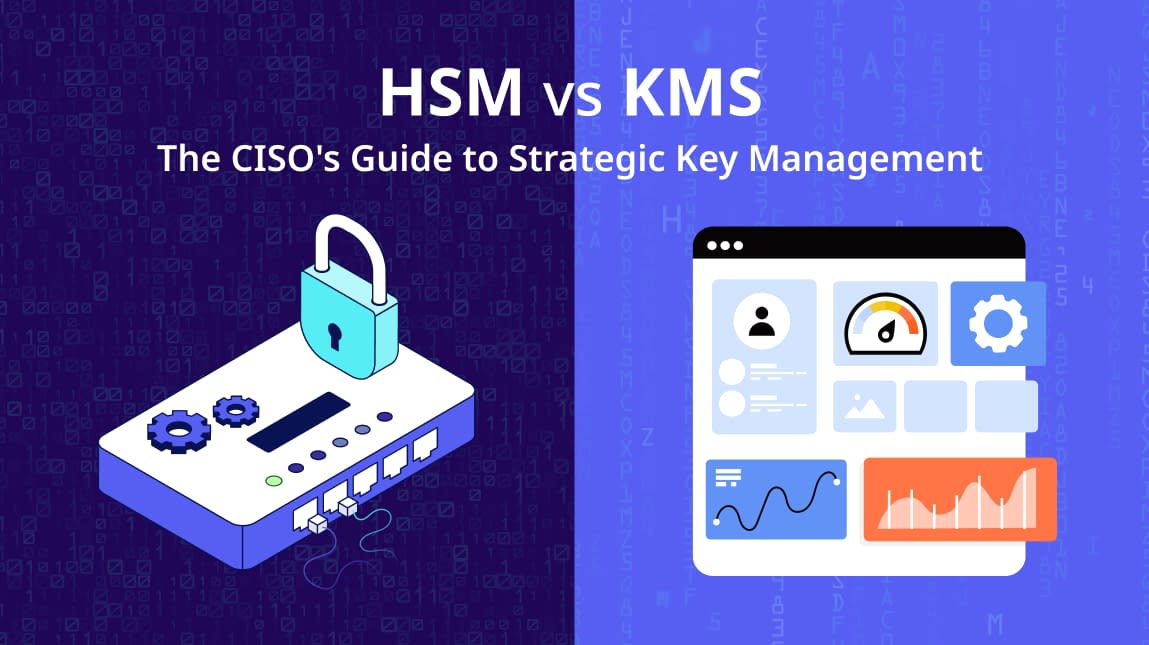Organizations managing sensitive data know that securing encryption keys and ensuring regulatory compliance are non-negotiable. For this, Thales HSM (Hardware Security Module) is often the go-to solution. However, integrating this robust technology into your existing infrastructure can be complex. The challenge isn’t just choosing the right HSM; it’s figuring out how to integrate it efficiently without risking downtime, compliance gaps, or data breaches.
What are Thales HSMs?
Thales HSMs are hardware-based security solutions designed to protect cryptographic keys, provide encryption, and ensure secure key management within a tamper-proof environment. Thales HSMs’ ability to integrate with cloud services, payment systems, public key infrastructure (PKI), key management systems (KMS), and code signing platforms makes it an invaluable tool for organizations across multiple industries. With Thales HSM, organizations can streamline their security operations while safeguarding sensitive data from breaches and misuse.
Key Thales HSMs at a Glance
Thales offers a powerful range of HSMs designed to protect sensitive data and manage cryptographic keys across different environments. Here’s a brief overview of the key product lines:
- Thales Luna HSM: A versatile solution for general-purpose key management and encryption. Luna HSMs support use cases like PKI, database encryption, and code signing. They are available in on-premise, cloud, and hybrid models.
- Thales payShield HSM: Specifically built for the payment industry, payShield HSMs secure PIN management, transaction validation, and message authentication. They meet PCI DSS compliance and are widely used by financial institutions and payment processors.
- Thales Cloud HSM: Designed for cloud deployments, Cloud HSMs integrate with providers like AWS, Azure, and Google Cloud to support the Bring Your Own Key (BYOK) model, offering secure key storage and control in cloud environments.
- Thales ProtectServer HSM: Provides a customizable encryption solution, allowing organizations to implement custom cryptographic algorithms, ideal for industries with unique security requirements.
In this article, we explore 5 key Thales HSM integrations designed to help you protect critical data and optimize your security infrastructure
5 Powerful Integrations for Thales HSMs (Hardware Security Modules)
As organizations face increasing security and compliance requirements, safeguarding sensitive data—especially cryptographic keys—becomes essential. Thales HSMs are trusted across industries to ensure encryption keys are securely stored and managed, providing strong cryptographic support for various operations. Proper integration of Thales HSM with your systems is key to unlocking its full potential, but it can be challenging without the right expertise.
Let’s explore five powerful Thales HSM integrations that can enhance your security infrastructure while overcoming common obstacles.
1. Secure Certificate Authorities with Thales Luna HSM
Certificate Authorities (CAs) are at the heart of digital trust, issuing digital certificates that verify identities and secure communications. If the private keys of CAs are compromised, the entire PKI system could collapse, leading to widespread security breaches. Thales Luna HSMs secure these private keys, ensuring that your CA remains trustworthy and uncompromised.
The Benefit:
Thales Luna HSMs provide a secure environment for Certificate Authorities by generating, storing, and managing root certificate keys. This ensures that all signing and key management operations are performed in a tamper-proof environment, protecting the integrity and confidentiality of digital certificates issued by the CA. By keeping CA keys secure, your organization can maintain trust in your PKI infrastructure while complying with regulations like FIPS 140-2 and eIDAS.
How It Works?
Thales HSM integrates with your CA by securely generating and storing private keys within the HSM’s tamper-resistant hardware. These keys are never exposed to external systems or unauthorized users. All certificate signing operations occur inside the HSM, ensuring that only authorized processes can access and use the keys for signing. This prevents unauthorized access or compromise of CA keys, thus maintaining the integrity of your entire PKI.
By storing root and subordinate keys within the HSM, your CA is fully protected from external threats, ensuring secure issuance of digital certificates and maintaining the chain of trust.
2. Thales HSMs for Database Encryption
Databases contain some of the most sensitive information within an organization—customer details, financial records, or confidential business data. Encrypting this data at rest is essential to protecting it from unauthorized access. Thales Luna HSMs provide robust key management for database encryption, ensuring that your encryption keys are securely stored and managed, while your data remains protected.
The Benefit:
Thales Luna HSMs integrate with database encryption solutions such as Transparent Data Encryption (TDE) to streamline the encryption and decryption of sensitive data at rest. The HSM securely manages the master encryption keys, ensuring that even if the database is compromised, the data remains unreadable. This protects your organization from data breaches and ensures compliance with regulations like HIPAA, GDPR, and PCI DSS.
How It Works?
Thales HSMs act as a secure vault for the master encryption keys used in database encryption solutions. When an application or database requests access to encrypted data, the HSM securely retrieves the encryption keys and facilitates the encryption or decryption process, ensuring that the keys are never exposed outside the HSM. This integration ensures that even if the database is breached, the master encryption keys are secure, and unauthorized users cannot decrypt the data.
Additionally, the HSM centrally manages key lifecycles, including generation, storage, and rotation of keys. Database encryption solutions like TDE interact with the HSM to securely access keys when needed, ensuring that sensitive data at rest is always protected.
3. Thales payShield HSMs for Payment Processing Security
The payment card industry is a prime target for cybercriminals, and ensuring the security of cardholder data is paramount for financial institutions and retailers. Thales payShield HSMs provide secure key management and cryptographic processing for payment transactions, ensuring compliance with the PCI DSS standards.
The Benefit:
Thales payShield HSMs meet the stringent security standards required by the PCI DSS and manage cryptographic keys used in payment transactions. These HSMs handle critical operations such as PIN processing, transaction validation, and message authentication, ensuring the confidentiality and integrity of payment data. By integrating payShield HSMs into your payment infrastructure, you prevent unauthorized access and fraud, protecting both your organization and your customers.
How It Works?
Thales payShield HSM integrates with payment processors and card networks by securely managing the cryptographic keys used for PIN encryption, transaction validation, and message authentication. The HSM performs cryptographic processing within a tamper-resistant environment, ensuring that sensitive data such as PINs and cardholder information remain confidential during the entire transaction lifecycle.
The HSM also validates transaction data to ensure that only authorized transactions are processed. By isolating and protecting the keys used in payment systems, payShield HSMs prevent physical and logical attacks, ensuring that cardholder data remains secure and compliant with PCI DSS requirements.
4. Enhance Code Signing with Thales HSMs
With cyberattacks on the rise, securing your software distribution pipeline is more important than ever. Code signing is a critical process for ensuring that software releases and updates come from a trusted source. Thales HSMs protect the private keys used for code signing, preventing unauthorized modifications and ensuring the integrity of your software.
The Benefit:
Thales HSMs protect your code signing keys, ensuring that only authorized individuals can sign code. This prevents the distribution of malicious or altered software and adds a layer of trust to your software releases. As the digital landscape evolves, new security measures—such as increased key lengths and cloud-based signing services—have emerged to enhance code signing security. Thales HSMs provide the necessary support for these industry changes, ensuring that your organization stays ahead of the curve.
How It Works?
Thales HSM integrates with your code signing infrastructure by securely generating and storing private signing keys. The HSM ensures that signing operations occur within a tamper-proof environment, minimizing the risk of key exposure or theft. When software needs to be signed, the HSM processes the signing operation, ensuring that only trusted and authorized code is released.
The HSM also supports evolving industry standards, such as the 3072-bit RSA key length required by the CA/Browser Forum for code signing and time-stamping certificates. By protecting code signing keys, Thales HSM ensures the integrity of your software distribution pipeline, preventing unauthorized software modifications and maintaining trust in your software updates.
5. Thales HSMs for Cloud Key Management
Organizations are increasingly adopting cloud infrastructure, but the security of encryption keys in cloud environments is a critical concern. Thales HSMs integrate with cloud-based key management systems (KMS) to provide a secure Bring Your Own Key (BYOK) model, giving organizations full control over their encryption keys.
The Benefit:
Thales HSMs integrate with cloud key management services (KMS) such as AWS KMS, Azure Key Vault, and Google Cloud KMS, enabling secure key storage and lifecycle management. This hybrid approach strengthens cloud data protection by ensuring that encryption keys are stored and managed within the HSM, not within the cloud provider’s infrastructure. This gives organizations full control and ownership of their encryption keys while ensuring compliance with regulations like GDPR and CCPA.
How It Works?
Cloud KMS solutions interact with Thales HSMs to securely generate, store, and manage encryption keys. These keys are stored within the HSM’s tamper-resistant environment, ensuring that they are not exposed to cloud providers or unauthorized users. The HSM enables secure key retrieval and lifecycle management, allowing cloud applications to encrypt and decrypt data without ever exposing the keys to potential threats.
This BYOK model provides granular control over your keys, allowing you to define key usage policies, rotate keys regularly, and revoke keys as needed. By integrating Thales HSM with cloud KMS, you enhance the security of your cloud infrastructure and maintain compliance with industry standards.
Fast-track your Thales HSM Integration with Accutive Security
Successfully integrating a Thales HSM into your security environment can appear overwhelming—whether it’s dealing with technical roadblocks or ensuring everything aligns with your security framework. Accutive Security helps you fast-track this process, by providing expertise that minimize disruptions and ensure your HSM is up and running quickly. Accutive Security’s team of certified Thales HSM experts have successfully completed hundreds of Thales HSM projects across the Luna, Cloud, ProtectServer and payShield products.
Here’s how Accutive Security’s HSM Services can help you get the most out of your Thales HSM:
- Understand your infrastructure: Instead of spending time figuring out how Thales HSM will fit, we help you quickly determine the best way to integrate it into your current systems, avoiding unnecessary trial and error.
- Simplify Technical Complexity: We handle the configuration and ensure it works effortlessly with your existing systems, so you can focus on your core responsibilities instead of troubleshooting.
- Avoid Downtime and Disruptions: We make sure your Thales HSM is integrated seamlessly so you don’t have to deal with interruptions to your workflow. Everything continues running smoothly while your security gets the upgrade it needs
- Monitor on your behalf: Once your HSM is up and running, we provide ongoing support, making sure everything stays optimized for security and compliance.













Comment